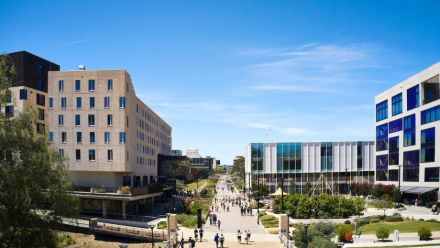Professor Ros explores the mysteries of early modern writers
A childhood love of reading and poetry paved the way for Professor Ros Smith's literary academic career.
"I came from a bookish home, and we didn't watch much TV, so reading was always a big part of my life," she says.
From studying sonnets that blackened the name of Mary Queen of Scots to a passion for early women's writing and marginalia, Professor Smith is now a leading international expert on the sonnet, the sonnet sequence, marginal annotation and complaint, as well as on the reception of early modern women's writing from the sixteenth century to the present.
With four ARC-funded projects currently underway - as lead CI on a 2019 ARC Linkage Project grant with the State Library Victoria, the ARC Future Fellowship project Marginalia and the Early Modern Woman Writer, and a ARC Discovery Project on early modern women and complaint, Professor Smith has just become CI5 on a 2023 ARC LIEF project on humanities mapping in Australia. She is also a partner on recent international grants from the Canadian research council and the University of Oxford investigating aspects of the material history of the book.
"To have worked on so many research grants in the humanities is relatively unique, especially in a field like early modern women's writing," she says.
"For me it's all about collaborating, and I love to connect people and resources to then be able to work at scale on questions that may otherwise not be understood."
In 2008 Professor Smith co-founded the Early Modern Women's Research Network (EMWRN), a centre for innovative early modern research using theoretical, material and digital scholarship methods.
It was through this network that Professor Smith secured her first ARC Discovery Project grant in 2012, leading a team examining the material cultures of early modern women's writing, and in doing so set the standard for taking a team approach to humanities research.
"It came from loving to collaborate and wanting to do things together, combined with deep friendships and trust, that has become an ongoing 20-year working relationship."
"We applied for that first Discovery Project as a group of five, and no one thought we had a chance. The assessors' reports were positive, which we felt was reward enough, and then we got the grant. It wasn't usual to apply as a collective then, but now it's standard."
Chair of English and Director of the Centre for Early Modern Studies at the ANU College of Arts and Social Sciences (CASS), Professor Smith studied Arts Law at Sydney University, and while she happily admits the law side wasn't for her, she earned an honours degree in English and was awarded the University Medal.
As well, she won a University of Sydney Travelling Scholarship to Oxford University, where she did her DPhil in early modern women's writing with Professor David Norbrook, Fellow and English tutor at Magdalen College, as her supervisor. She has just completed a year-long fellowship back at Oxford at Merton College for her marginalia research and where she has set up an international consortium of Centres for Early Modern Studies, led from ANU.
Professor Smith says her passion for early modern writers comes from the mystery of it.
"I find it incredible that there's been scholarship for hundreds of years on the early modern period, but there is still so much to discover," she says.
"The Future Fellowship and the women's marginalia project will be an absolute example of that. This is a whole corpus of women's writing that no one has ever looked at. And to understand the marginalia, what people are thinking as they are reading, gives an amazing insight into their lives in the period."
"Everything we do adds a little bit to the story of women's history and representation, but there is still so much we don't know."


